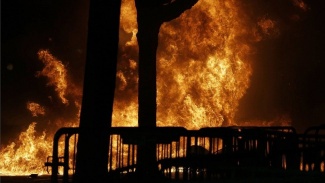 t's often said that freedom of speech doesn't permit you to shout
‘Fire’ in a crowded theater, the idea being that people will
supposedly trample each other and chew each other's arms and legs off
trying to escape.
t's often said that freedom of speech doesn't permit you to shout
‘Fire’ in a crowded theater, the idea being that people will
supposedly trample each other and chew each other's arms and legs off
trying to escape.
We libertarians have our own response: if there's a fire, leave the theater. If the others aren't concerned about being burned to a crisp, that's their problem. I'm exaggerating—a bit—but in general it's a useful philosophy: humans are determined to burn their civilization down and go extinct, and there's not much you could do to stop them, even if you cared to. And the humans always, always start with suppressing freedom of speech, because that's the only way to make the lies that always follow believable.

Fire at Berkeley in February 2017 as students rioted to prevent Milo Yiannopoulos from speaking (source: AP). Proof that students do know how to start fires
It does seem to me that more research is needed: do they panic more if someone yells “Fire!” or if they discover themselves suddenly encased in a suffocating opaque cloud of deadly smoke? But it's also an example of how oversimplified models designed to block freedom of speech can do more harm than good.
Much depends, of course, on how big the fire is. If it's small, throwing your slurpee on it might stop it. I haven't been to a theater since our culture disintegrated, and things may have changed. For one thing, there is now no such thing as a crowded theater.
(On that topic, how sad that so few of today's young people know what it's like to live in a vibrant culture. What we have today are the dying embers, the stars fading just slowly enough that it takes years to notice. The purpose of the censorship and the attempts to erase our past is not to suppress dissent; its purpose is to conceal the fact that our culture is dying.)
I suppose, upon reflection, that the best solution might be to go up to the projectionist booth and tell him or her to stop the film, if that's what they're still using, and turn the house lights on. People will then notice that there is, indeed, an odd smell, and the air seems unusually cloudy, and they can exit or take pictures of it with their cell phones as they choose. But in the example, this is not an option.
Thinking about hypothetical scenarios and how you'd handle them may be fun, but in the fire-yelling example—and we're assuming there really is a fire, because if you were just lying, the patrons would beat you to a pulp for making them miss Debby doing Dallas—the example was proposed as an example of where freedom of speech should be limited. This means we're not being asked to identify the optimal strategy, but answer a yes-or-no question. In that hypothetical possible world, your only option is to yell fire or remain silent. Which is better?
Given a hypothetical binary choice, where the decider is left quivering in uncertainty trying to calculate whether to allow one's fellow humans to be consumed in flames or to risk being dragged into court for warning them, thereby becoming unemployed and pilloried by the press, the least bad option is indeed absolute unfettered freedom of speech.
But the correct solution is: if you see a fire in a crowded theater, forget about the goofballs in Washington trying to entangle us in rules. Pick up the nearest fire extinguisher and put it out. Why is it no one is supposed to consider that option? You know how to use one, don't you?
No, of course you don't. The students in my biochem lab just laughed when I told them they must always know where the nearest extinguisher, eyewash station, and emergency shower are located. That's part of the safety training I'm required to give them, but I don't for a moment believe that any of them would be able to remember where they are, let alone be able to figure out how to work them (and I'm speaking from experience here, having observed their behavior in our big coffee pot conference room fire of 2002). Twitter has given them the memory retention of goldfish.
Besides, like everybody else, you're really thinking how to get some great shots of people screaming and trampling each other to put on Twitter. And maybe getting some flames in the background. Which is why you're the one standing there yelling fire.
Of course, no one is listening. Partly because they want to shut you up so their voice will become more effective. But mainly because thanks to the flood of fake news, nobody believes nobody no more.
Edit If yelling fire in a crowded theater is a crime, then fire alarms, which do exactly the same thing, must also be banned.
feb 14 2021, 8:08 am
